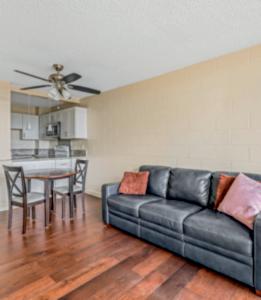

Co-buying start-ups help homebuyers hack the market
Jeff OstrowskiBANKRATE.COM
As a longtime resident of Northern California, Weldon Hall for decades tried to become a homeowner. With home prices in the Bay Area moving ever out of reach and mortgage rates rising, he had all but given up.
“I’ve been working as a professional for decades now,” says Hall, an engineer in his 40s. “No matter how much you try to save, that goalpost just keeps getting moved further and further and further.”
Then he discovered a concept known as co-buying. Hall and a close friend, fellow engineer John Cross, pooled their resources to become co-owners of a four-unit property in Oakland.
The transaction was smoothed by Nestment, a San Francisco-based startup that helps people navigate the details of buying a home with a friend.
A helping hand for co-buyers
Co-buyers are a niche market — fully 59 percent of American homebuyers are married couples, while 29 percent are single and 9 percent are unmarried couples, according to the National Association of Realtors.
Co-buyers can and do purchase homes without any specialized help, but affordability trends have spurred a new wave of co-buying companies, including CoBuy, Nestment and Pairadime.
Nestment provides homebuyers with a “co-buying specialist,” someone who coaches buyers through budgeting and financial projections, guides them through the legal process and connects them with real estate agents and
Real estate Q&A
Gary M. Singer SOUTH FLORIDA SUN SENTINELQ: We recently signed a contract to sell our home. Yesterday, our real estate agent told us the buyer was canceling because they could not get financing. We feel we should be able to keep the deposit because we denied other offers for this one and wasted more than a month. Do we need to return the deposit?
— Jacques
A: When a seller and buyer agree on the terms of a home sale, they have to follow those terms.
While every contract has unique terms, they have much in common. The buyer will put up an earnest money deposit, and if they breach the contract later, the seller can keep that deposit.
This is called “liquidated damages,” which is an agreed amount to the seller for the time and costs of the failed attempt.
The two most common contingencies concern the property’s condition and the buyer’s ability to get a loan. If the contract has these contingencies and the property is in worse condition than expected, or the buyer fails to get a loan despite trying to do so, the deposit must be returned to the buyer.
However, there are occasions when a qualified buyer will get cold feet and try to escape the contract without giving up the deposit by fabricating a problem that gets the loan rejected.
To address your situation, you need to review the financing section of your contract. Check if the buyer told you they were not approved by the deadline.
If your contract required the buyer to apply for a specific type of loan check that they did, as getting denied for a different type of loan could allow you to keep the deposit.
Ask why the loan was denied and if it was intentional, for example, if the buyer refused to provide their tax returns.
If, after all of this, it appears the buyer acted in good faith and told you by the deadline, you should return the deposit. However, if the deadline was ignored or the denial is suspicious, you may be able to keep the money.

mortgage lenders familiar with the nuances of co-buying.
The company doesn’t match co-buyers, however; you have to find a partner (or partners) on your own.
While that might pose a challenge, it won’t be as difficult to apply for one mortgage once you identify a partner, provided you’re both qualified.
“You’d be surprised at how many people don’t know four co-borrowers can be on a loan,” says Niles Lichtenstein, founder of Nestment.
Nestment recommends that buyers create a formal legal entity to take ownership of the home. Most commonly, that means setting up a limited liability company (LLC). In some cases, a tenancy in common (TIC) is the better way to take ownership of the property. Tenancy in common is a popular type of co-ownership, but it doesn’t include right of survivorship for the remaining owner (or owners) if one owner were to die.
The co-buyers don’t pay Nestment any extra fees, but they are on the hook for the usual mortgage closing costs, such as an appraisal and credit check. The company receives a 1 percent referral fee from the co-buyers’ real estate agent.
The rules around buyer agent fees are set to change this summer, however, if a legal settlement agreed to by the National Association of Realtors takes effect. Lichtenstein doesn’t expect that to have a major impact on Nestment’s model.
“From what we’ve seen thus far post-NAR ruling, buying fees won’t disappear, but there will be a bit more formality,” Lichtenstein says. “All of our groups have readily expressed they would have been willing to have paid themselves, as they felt it couldn’t have happened without Nestment.”
CoBuy, based in Seattle, works a bit differently. The company is developing an app to help manage the process for co-buyers, includ-
ing drawing up a co-ownership agreement. Currently, interested buyers can sign up for a wait list of the app’s beta stage, which costs an annual fee of $270.
Pairadime, also based in Washington, matches co-buyers with real estate agents and helps create legal agreements. The service is free for co-buyers working with agents affiliated with the company. If the co-buyers’ agent isn’t working with the company, buyers can opt to pay $795 to draft a contract.
Matching up with the right partner
Often the biggest challenge to co-buying is finding a partner you trust and like enough to own property with — and someone with a solid credit and financial picture. In underwriting, a mortgage lender generally considers the lowest credit score among a group of buyers.
Hall and Cross are longtime friends who have worked at the same startups over the years. They were able to land a Fannie Mae loan with a 10 percent down payment and close on a $1.4 million property in February. They plan to each live in a unit and rent out the other two units.
Your co-buying partner doesn’t have to be someone you intend to live with, however.
Emily Debevec and Kim Gomez recently co-bought a Los Angeles property through Nestment. The friends paid $945,000 for a property that includes a single-family home and two apartments. Debevec and her partner live in the house, while tenants live in the apartments. Gomez is an investor, but doesn’t live in the property.
The pair became tight through their running group, Good Vibes Track Club, which focuses on marathon training. While Debevec and Gomez don’t run side by side in 26.2-mile races, they’ve bonded while training together.
“You see very quickly how people commit to different things in their lives,” Debevec says. “When you’re training for distance races, you spend a lot of time together. I didn’t hesitate for a moment, because I’ve seen all sides of Kim.”
Co-buying a home: pros and cons
w You can actually buy a home. If home prices and interest rates have locked you out of the market, co-buying gives you an opportunity to become a homeowner — and build equity as the value of the property rises.
w You’ll have more buying power. By joining forces with a cobuyer, you can afford a more expensive property than you could get by yourself. That’s because co-buyers combine down payments and qualifying incomes. w It’s complicated. Co-buying is perfectly legit, but it’s a niche concept, so some mortgage lenders and real estate agents might not be up to speed. Even with the help of a co-buying company, you might still need to enlist a real estate attorney for guidance. w There’s a risk for legal issues down the line. Co-buyers bear joint and several liability, which in plain English means either party can be held responsible for the entire amount of the home loan. If you co-buy with a friend and that borrower loses their job and can’t pay their share of the mortgage, the lender will expect the full payment from you.
























































behalfof PrincevilleOceanResortVillasOwnersAssociation,aHawaii nonprofitcorporation bysaleofpropertysecuredtherebyatpublicauction on 07/12/2024 at 1:00PM at VidinhaStadium,HoolakoSt,Lihue, HI96766(underthetrees,atentrancetothestadium). Eachofthe propertiestobesoldisaTimeshareInterestat PrincevilleOceanResort Villas establishedbycertainDeclarationrecordedas DocumentNo.200520112 5intheofficeofBureauofConveyancesorAssistantRegistrarofthe LandCourt,StateofHawaiiandasamendedandwhichpropertyislocatedat 3838WyllieRoad,Princeville,HI,96722. TheTimeshareInterestas notedontheNoticeofLien,whichhasbeenfiledagainsttherecordowneras consistsofdelinquentmaintenancefees,(plusinterest,latecharges,and collectionandenforcementcosts).Termsofthesaleare:(1)Noupsetprice. (2)Propertysoldwithoutcovenantorwarranty,expressorimplied,astothe titlepossessionorencumbrances;(3)Atthecloseoftheauction,Purchaser shallpay100%ofthehighestsuccessfulbidprice(“Bid”)bycertified,or cashier’schecktoFIRSTAMERICANTITLECOMPANY;providedthatthe Associationmaysubmitacreditbiduptotheamountofthesecured indebtedness;(4)Purchasershallpayallclosingcostsincluding,butnot limitedto:costsofdocumentdrafting,notaryfees,consentfees,escrowfees, conveyancetax,recordationfeesandothercharges,togetherwithanyspecial assessmentswhichmayariseunderHRS514B-146(g)(h)(i);(5)Iftitleisnot conveyedtoPurchaserforanyreason,otherthanPurchaser’sfailureto performasspecifiedherein,theAssociation’ssoleresponsibilityshallbethe returnoftheBidfundstenderedbyPurchaser.ThePurchasershallhaveno furtherrecourseagainsttheAssociationoritsagents,attorneys,servicersand auctioneers;(6)Thesalemaybepostponedfromtimetotimebypublic announcementbytheAssociationorsomeoneactingonitsbehalf;(7)By submittingtheBid,Purchaseracknowledgesreadingthetermsandconditions setforthinthisnoticeandagreestobeboundtherebyandsignawritten acceptanceofalltermsherein.Forfurtherinformationregardingthissale,you mustcontact FirstAmericanTitleInsuranceCompany,aNebraska corporationat(702)304-7509. Conductorofthepublicsaleinthestate ofHawaii:AQUALEGALLLConbehalfof,FirstAmericanTitle,agentfor Claimant;Phone:(808)539-7504;Address:1099AlakeaStreet,suite2430, Honolulu,Hawaii96813.BatchNo: ForeclosureHOA140708-POR65HOA.Schedule“1”: LienRecordingDateandReference,TimeshareInterest (ContractNo.),Owner(s);02/22/2024Inst:A-88180646,312625-02EP407255,TamaraLynnHeath-UnderbrinkandMichaelAnthonyUnderbrink; 05/03/2022Inst:A-81580894,411211-11AP-418773,LarryKentBarnthouse andSandraGauthierBarnthouse;05/10/2023Inst:A-85300614,42010227AP-410753,RodolfoHerraizPardoZaragozaandGabrielaHidalgo Zaragoza;02/22/2024Inst:A-88180646,420910-25AP-411408,Tamara LynnHeath-UnderbrinkandMichaelAnthonyUnderbrink;09/08/2023Inst: A-86510447,521210-15OP-414835,RobertW.MckinleyandBarbaraE. ShafferMckinley;06/25/2019Inst:A-71150366,531416-33AP-416561, TadayoshiLutherInoueandBernadetteInoue;04/24/2024Inst:88800528, 620301-06AP-416221,DavidForkerGlossbrenner;04/24/2024Inst: A-88800528,620402-44AP-419648,DavidForkerGlossbrenner;05/10/2023 Inst:A-85300614,620402-47AP-406835,JoseBernardoRebeilandThelma MarcelaRebeil;05/03/2022Inst:A-81580894,711817-45AP-418772, LarryKentBarnthouseandSandraGauthierBarnthouse;05/03/2022Inst: A-81580894,720402-10AP-418773,LarryKentBarnthouseandSandra GauthierBarnthouse;05/03/2022Inst:A-81580894,730608-38OP-418774, Larry Kent Barnthouse and Sandra Gauthier Barnthouse. (TGI1457581 6/14, 6/21, 6/28/24)






























